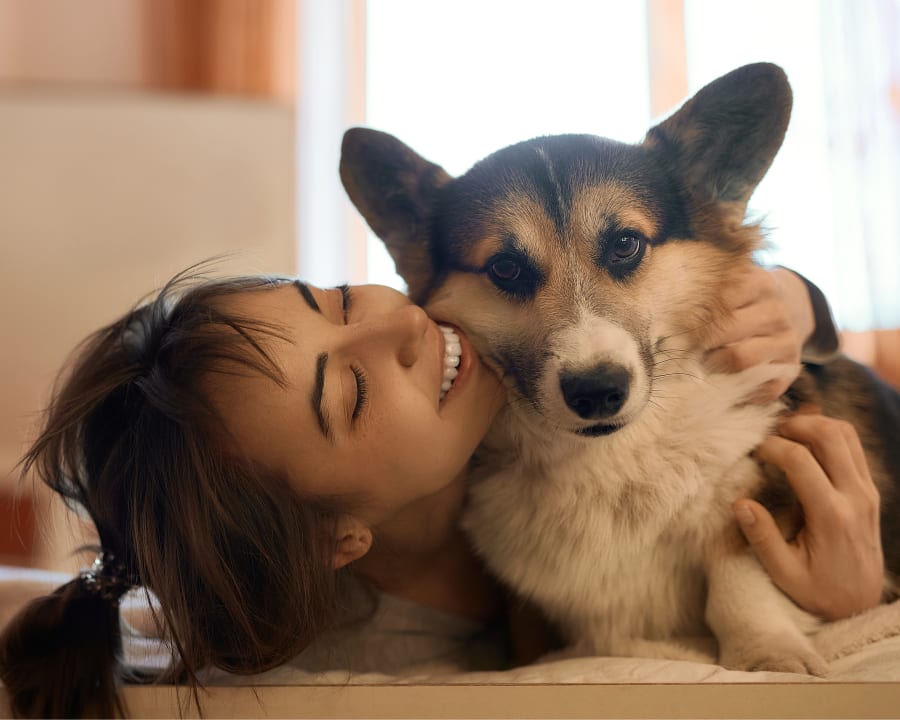Caring for Senior Dogs & Cats
Dogs are commonly considered seniors at seven years old and cats at 10 years old. Around this time, you may start to notice your dog or cat slowing down and their typical behaviours might even change. They may be less inclined to participate in physical activity and their health may even start to decline.
Senior dogs and cats can be much more susceptible to illness and disease than they were when they were younger, so they need extra care and attention at this stage of their life. Helping your beloved companion maintain a good quality of life as they reach old age is one of our top priorities.
In many cases, routine care may help extend your dog or cat's life and good health as they enter their golden years. For this reason, it is important that you maintain a regular wellness exam schedule, even if your pet seems healthy. We recommend visits at least twice a year for senior cats and dogs, with more frequent visits if they have serious health issues.
Nutritional requirements for senior cats and dogs will start to change as they age. Our team can recommend specific diets for your cat or dog's individual physical needs.

Health Problems in Senior Pets
Improvements in nutrition and advances in veterinary science mean that our cherished cats and dogs are living much longer than in the past.
While this is unquestionably a cause for celebration, pet owners and veterinarians are now faced with the challenge of managing the related conditions that come with advanced age.
Some of the age-related health problems we commonly see in elderly pets include:
-
Cancer
The unfortunate reality is that many of our pets will develop cancer in their lifetime. Bringing your senior pet in for routine checkups even when they seem healthy allows your veterinarian to examine your dog or cat for early signs of cancer. Earlier diagnosis typically results in better treatment outcomes.
-
Joint or Bone Disorders
Senior Dogs
As your dog reaches their golden years, there are a number of joint or bone disorders that can result in pain and discomfort. Some of the most common joint and bone disorders in senior pets that our veterinarians see include arthritis, hip dysplasia, osteochondrosis, a reduction in spinal flexibility, and growth plate disorders.
Addressing these issues early is essential for keeping your dog comfortable as they continue to age. Treatment for joint and bone issues in senior dogs ranges from simply reducing levels of exercise, to the use of analgesics and anti-inflammatory drugs, to surgery to remove diseased tissue, stabilize joints, or reduce pain.
Senior Cats
While osteoarthritis is typically an issue we associate with older dogs, this painful degenerative disorder can also affect your senior cat's joints.
Common signs of lameness that are seen in dogs are not commonly reported by cat owners. Symptoms of osteoarthritis in cats are more subtle than those in dogs. While cats can experience a decrease in range of motion, the most common symptoms of osteoarthritis in senior cats include weight loss, loss of appetite, depression, change in general attitude, poor grooming habits, urination or defecation outside the litter pan, and the inability to jump on and off objects.
-
Heart Disease
Heart disease can be a problem for senior pets. Senior dogs often develop conditions such as congestive heart failure.
While heart disease is seen less in cats, feline hypertrophic cardiomyopathy (HCM) is relatively common.
-
Blindness & Hearing Loss
Degeneration in the eyes and ears can lead to varying degrees of deafness and blindness in older pets, particularly dogs.
Loss of hearing and eyesight often come on slowly, allowing senior pets to adjust their behaviour, making it difficult for pet owners to notice.
-
Liver Disease
Liver disease is common in elderly cats and may be the result of high blood pressure or hyperthyroidism. Symptoms of liver disease in cats include loss of appetite, jaundice, drooling, vomiting, diarrhea, and increased thirst.
In dogs, the signs of liver disease can include vomiting, diarrhea, fever, jaundice, abdominal fluid buildup, and weight loss.
-
Diabetes
Although dogs and cats can develop diabetes at any age, most are diagnosed once they've reached their senior years.
Symptoms of diabetes in dogs and cats include excessive thirst, increased appetite accompanied by weight loss, cloudy eyes, and chronic or recurring infections.
-
Kidney Disease
Kidney function tends to decline as pets age. This can be due to a natural decline in function or, in some cases, medications used to treat other health issues can lead to kidney problems.
While chronic kidney disease cannot be cured, it can often be managed with a prescription diet and medications.
-
Incontinence
Elderly pets can be prone to accidents as the muscles controlling the bladder begin to weaken. Incontinence can be a sign of a bigger health issue, such as a urinary tract infection or dementia, and should never be ignored.
If your senior pet experiences incontinence issues, make an appointment to have them seen by a veterinarian as soon as possible.
Routine Exams & Your Senior Dog or Cat
Regular examinations for senior dogs and cats provide our veterinarians with the opportunity to detect developing issues early. When a health condition, like cancer, diabetes or heart disease, is detected in its earlier, more manageable stages, treatment can begin sooner. This can often slow or stop its progression.
Our veterinarians will thoroughly examine your senior dog or cat and ask about their diet and lifestyle. Testing may be recommended to gain additional insight into your pet's overall health.
Next, your veterinarian will recommend a treatment plan to address any existing health problems and help prevent potential age-related issues.
Recommendations may include changes to your dog or cat’s diet or exercise routine, as well as medications to help your senior pet stay happy and comfortable.

